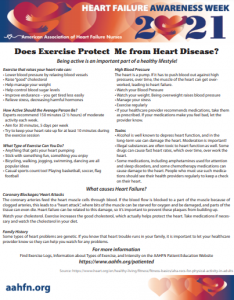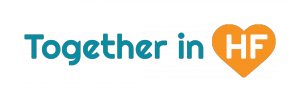The American Association of Heart Failure Nurses “Embrace Heart Failure Prevention” Campaign for HF Awareness Week 2021
AAHFN launches “Embrace Heart Failure Prevention,” a heart failure awareness campaign to develop actionable approaches to decreasing heart failure.
MOUNT LAUREL, NEW JERSEY, UNITED STATES, February 12, 2021 /EINPresswire.com/ -- The American Association of Heart Failure Nurses (AAHFN) is pleased to announce, “Embrace Heart Failure Prevention,” a week-long heart failure awareness campaign centered around raising awareness and developing actionable approaches to decreasing heart failure.The prevalence and statistics of heart failure reveals that 6 million Americans are currently diagnosed with heart failure and by 2030, this number will rise to 8 million or 3% of our population.(1) Patients with heart failure have an increased risk of experiencing serious complications related to the progression of the disease, including unintended consequences of the medications used to manage their condition.
“As we start a new decade, we must refocus our efforts to make actively preventing heart disease a priority. It cannot just be policy makes, academics and public health do-gooders. It needs to be every nurse, physician, professional organization and researcher helping to educate the public, patients, friends and families on simple prevention strategies.” Carolyn Miller Reilly, PhD, RN, CHFN-K, CNE, FAHA, FAAN, Professor at the Emory University Neil Hodgson Woodruff School of Nursing.
AAHFN is taking a stand in 2021 to make this the Year of Prevention and will be releasing multiple educational opportunities, patient education materials and publications to support the “Embrace Heart Failure Prevention” campaign. No one is immune and it is important to educate patients, nurses and caregivers to make actionable changes in their own lives to stay protected and become healthier. The first step to do this is to understand the four stages of heart failure:
Stage A classification is assigned to those at high risk of heart failure (due to family history of heart failure or one of the following: hypertension, diabetes, coronary artery disease, metabolic syndrome, history of alcohol abuse, rheumatic fever, and/or cardiotoxic drugs), who do not have structural heart disease or symptoms of heart failure;
Stage B classification is assigned to those with structural heart disease but without signs of symptoms of heart failure;
Stage C is structural heart disease with prior or current symptoms of heart failure; and
Stage D is refractory heart failure requiring specialized interventions.
The “Embrace Heart Failure Prevention” campaign is a call to nurses and caregivers to focus on individuals in Stages A and B of heart failure. “This is where nursing really shines – primary prevention – before the development of disease. AAHFN is working tirelessly to improve the lives of heart failure patients and their caregivers.” Beth Davidson DNP, ACNP, CHFN, CCRN, FHFSA, AAHFN President. The campaign includes tips sheets and tools to promote education on heart failure prevention strategies for patients, nurses and caregivers. The tip sheets include topics of exercise, alcohol, dysrhythmias, obesity, high blood pressure and sleep disorders in relation to how they can affect heart failure and the necessary steps to prevent it.
Visit aahfn.org to access all campaign resources for patients, nurses and caregivers to promote heart failure prevention education. For more information on the 2021 “Embrace Heart Failure Prevention” campaign, please visit https://www.aahfn.org/hfawarenessweek2021.
About Heart Failure
Heart failure, which means the heart does not contract with enough force to pump sufficient blood throughout the body, is a debilitating and life-threatening condition, affecting nearly 6 million Americans.(2,3) It is the leading cause of hospitalization among Americans over the age of 65.(4) Heart failure presents a major and growing health-economic burden that currently exceeds $30 billion in the United States, which accounts for both direct and indirect costs.(2,5)
About the American Association of Heart Failure Nurses (AAHFN)
The AAHFN is a nonprofit specialty organization dedicated to advancing nursing education, clinical practice and research to improve heart failure patient outcomes. The goal of AAHFN is to set the standards for heart failure nursing care. The American Association of Heart Failure Nurses unites professionals, patients and caregivers in the support and advancement of heart failure practice, education and research, thus promoting optimal patient outcomes. AAHFN serves as the interface for sharing ideas, translating research findings into practice and setting priorities for the future. AAHFN focus’ on patients across all environments of care from the hospital, to the clinic, to home.
References
1. Virani SS, Alonso A, Aparicio HJ, et al. Heart Disease and Stroke Statistics- 2021 Update: A Report From the American Heart Association. Circulation.0(0): CIR.0000000000000950.
2. Mozaffarian D, Benjamin EJ, Go AS, et al. Heart Disease and Stroke Statistics—2016 Update: A report from the American Heart Association. Circulation. 2016; 132:000-000. doi: 10.1161/CIR.0000000000000350.
3. Fauci A, Longo D. Disorders of the Heart. Harrison’s ‘Principles of Internal Medicine. 17th ed. New York, NY; McGraw-Hill Book Co; 2008;4:1442-55.
4. Wier LM, Pfuntner A, Maeda J, et al. HCUP Facts and Figures: Statistics on Hospital-based Care in the United States, 2009. Agency for Healthcare Research and Quality. 2011; 1-3.
5. Heidenreich PA, Albert NM, Allen LA, et al. Forecasting the impact of heart failure in the United States: a policy statement from the American Heart Association. Circ Heart Fail. 2013;6:606-619.
Gallagher R, Luttik M-L, Jaarsma T. Social Support and Self-care in Heart Failure. J Card Nurs. 2011; Vol. 26, No. 6, pp 439-445.
Karyn Lockshine
American Association of Heart Failure Nurses
+1 856-793-0806
klockshine@aahfn.org
Visit us on social media:
Facebook
Twitter
Legal Disclaimer:
EIN Presswire provides this news content "as is" without warranty of any kind. We do not accept any responsibility or liability for the accuracy, content, images, videos, licenses, completeness, legality, or reliability of the information contained in this article. If you have any complaints or copyright issues related to this article, kindly contact the author above.



